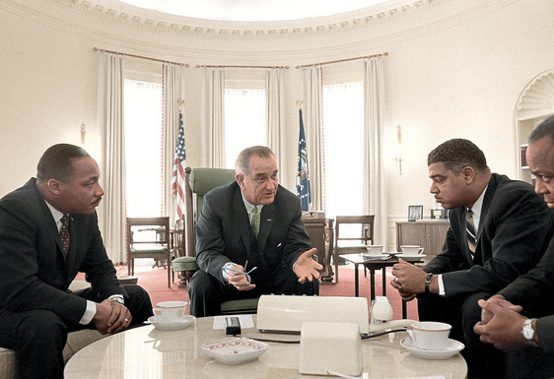Recovering Whitney Young, Civil Rights Hero

“You don’t get black power by chanting it. You get it by doing what the other groups have done. The Irish kept quiet. They didn’t shout “Irish Power”, “Jew Power”, [or] “Italian Power”. They kept their mouths shut and took over the police department of New York City, and the mayorship of Boston.”
–Whitney Young, 1968
Most people, when asked to name prominent civil rights leaders and activists, stick to the the brightest stars: Martin Luther King, Jr., Rosa Parks, and Malcolm X. The history is egregiously abridged: a woman refused to go to the back of a bus, a man in Washington had a dream, an elegant Muslim with a jazz quartet goatee warned, “by any means necessary”. After a great struggle, civil rights were granted to African Americans, and the country redeemed its conscience after several hundred years of slavery and abhorrent treatment of blacks. An angry group of activists called the Black Panthers were also in the mix, but no one discusses their provocative clothing and displayed weapons in polite company.
At no point is the name Whitney Young mentioned, not even as an afterthought. Young, who advised presidents, expanded the National Urban League, and effectively negotiated with powerful businesses to incorporate diverse hiring practices, is erased from the pages of the Book of Civil Rights Leaders. President Richard Nixon offered this glowing epitaph at Young’s funeral: “Whitney Young’s genius was that he knew how to accomplish what other people were merely for.” How could a man whose influence extended to the Oval Office and boardrooms of Fortune 500 companies be forgotten?
There is a possible explanation for this scrubbing from history. Despite Young’s training as a social worker and his leadership role in the civil right movement, his politics may not have been sufficiently progressive to satisfy his compatriots. His association with white business leaders exposed him to criticism from Black Panthers spokesman Stokely Carmichael and liberal politician Adam Clayton Powell, Jr., who all but called him an “Uncle Tom” in their excoriations. The civil rights movement turned sharply to the left in the late 1960s after the assassinations of King and Malcolm X, and anyone who did not tow the increasingly leftist line was pushed out. It is not surprising, then, that a man who got corporate America on board with the civil rights movement was later excluded from the civil rights’ great cloud of witnesses.
Whitney Young, Jr. was born on July 31, 1921, to educated parents. His father was the principal of the black boarding school Lincoln Institute, and his mother was a teacher. From childhood through early adulthood, Young was instilled with the value of education and enjoyed the high self-esteem that accompanied it. Perhaps another reason history passes over Young is his background. A child surrounded in a bubble of privilege where he wanted for nothing and received a top-notch education is not an experience many blacks had in the 1920s. But with his privilege came a sense of duty to others who were less fortunate—Young’s undergraduate degree, completed at age 18, was in social work. It wasn’t until Young was in the army, however, where he discovered his true calling for conflict resolution and negotiation to diffuse tension among black and white laborers. After completing a Master’s Degree in Social Work at the University of Minnesota, he became the head of the National Urban League, a position that propelled him to the forefront of the shifting political landscape, where he would leave his mark on history.
Though Young worked tirelessly alongside civil rights leaders such as King and James Farmer to convince the powerful that it was time to grant civil rights to blacks, his greatest contribution was winning over the private sector. Young used his skill as a negotiator and charm to persuade executives at top companies such as General Motors to reform their hiring practices to include more black workers. As someone who personified the Midwestern values of solid work ethic and dignity, Young was able to both empathize with executives’ concerns while advocating for blacks. No other civil rights leader was able to accomplish this feat.
And that’s precisely where Young ran into trouble. Other civil rights leaders were suspicious of Young’s motives, especially because of Young’s belief in the role of white cooperation to level the playing field. Adam Clayton Powell Jr.’s criticism was particularly scathing: in one speech he dubbed Young “Whitey Young” and labeled him the “Wall Street of the civil rights movement.” Powell’s comments were in line with the onslaught of the late-1960s identity politics dogma pitting white against black. The new political law of the land dictated that Young was an out-of-touch white sympathizer. These public condemnations were enough to paralyze the political clout Whitney had worked his life to build. He died of a heart attack in 1971 on a trip to Ghana, and has been all but forgotten since.
Young would not make a significant reappearance on the radar until a year ago, when Young’s niece Bonnie Boswell produced an excellent documentary, “The Powerbroker:Whitney Young’s Fight for Civil Rights,” that aired on PBS last February. Apart from the documentary, information about Young is scarce: there is his Wikipedia page and an interview with Young’s daughter, Marcia Cantarella, who has followed in her family’s educating footsteps. It’s frustrating that there is not more material out there about such an important figure, but the documentary is a good start. It is very well done, and is an important first step in resurrecting Young’s legacy from the petty political sniping it to which it fell victim 40 years ago.
Comments